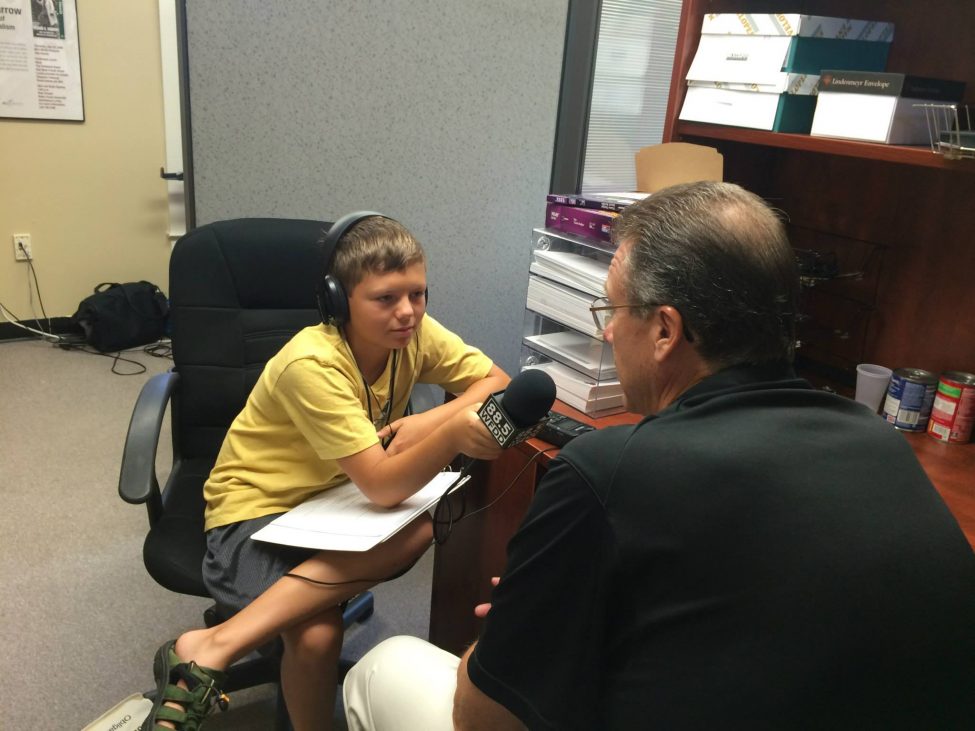“This was the first time I talked with my mom about this,” said a recent student of WFDD’s Radio 101 program, unprompted and nonchalant.
This student was doing a personal reflection story on what it was like to grow up not knowing her father was addicted to drugs and alcohol. Using the interview techniques she learned in 88.5 WFDD’s Radio 101 program, she sat down with her mother and started with simple questions like, “Can you tell me a little about your life before I was born?” Later questions would get interrupted by tears and choked up voices.
That’s the vision behind 88.5 WFDD’s Education Program: allowing students to have deep and real conversations about the issues that are close to their hearts.
WFDD prides itself in producing content, and providing services, that not only inform, but also inspire the Piedmont Triad communities we serve in the Piedmont and High Country of North Carolina and southern Virginia from our home in Winston-Salem, NC.
The goal of WFDD’s Education Program is for each story to reflect the diverse experiences of our students. Radio Camp, our middle school age program, and Radio 101, our high school age program, provide children with the platform and the tools to tell their stories. The stories are inside of them; they only need someone who is willing to listen. This reflects a core value of public media: to develop programming that reflects the interests and experiences of Americans.
However, the road to get here has not been without bumps and bruises. The first week-long Radio Camp barely filled up with enough kids. But we believed in what the program could be, so we kept it alive. As soon as parents and kids saw how impactful just one week of audio storytelling could be, the program began to grow. It has quickly evolved into one of the station’s most successful and recognized programs, with its highest-ever enrollment for Summer 2018. This summer’s three scheduled sessions of Radio Camp filled up in a matter of just a few weeks and the waitlist keeps growing. During a week of Radio Camp, kids not only learn skills that are completely transferable –like public speaking, writing, and researching – but they also get to explore a largely unfamiliar medium for them: public radio.
Just a year after the first Radio Camp, WFDD expanded its education program to include an option for high school students: Radio 101. In partnership with local high schools, this program allows students to explore issues such as race, identity, drugs and addiction, and family…to mention a few. It also provides WFDD listeners with unique insights into the minds of a population that doesn’t often open up to adults, and introduces a much younger generation to the world of public radio.
While most of the program budget comes from our donors and local organizations, it is CPB funding that allows WFDD to expand initiatives like our education program to better serve our community. Since Fall 2017 Radio 101 has become a for-credit class in one of the most diverse schools in the area, allowing students from all backgrounds and socioeconomic levels to explore all of audio storytelling’s possibilities.
Our education programs exist to teach young students about the power of audio storytelling. What we didn’t know when we started this adventure was how much we were going to learn from the students themselves. In the past couple of years we have learned what it feels like to have been diagnosed with ADHD, or have your mother battle cancer, or not to feel comfortable in your own skin. Everyone’s story is unique, but their themes are universal. We look forward to learning from our current and future campers – and maybe one day hearing them as professional public radio personalities.
Federal funding provides critical support to WFDD and our work to develop education programs like Radio Camp and Radio 101 and to provide local content and services to our community.
Gabriel Maisonnave is the education program manager of WFDD where he helps students tell their stories through the station’s Radio Camp and Radio 101 programs. Prior to joining WFDD, he reported on stories of peace-builders from all around the world, of organizations in Kenya and Uganda working in conflict settings and of those in Haiti who were forgotten by most aid organizations, among other things. Maisonnave earned his BA in International Relations from the Universidad del Salvador in Buenos Aires and his MA in Media and Journalism from UNC-Chapel Hill. Gabriel’s thesis project: “Can You Hear Me Now?: Stories International Development Organizations Left Behind” was recognized with the Minnie S. and Eli A. Rubinstein Research Award by the UNC School of Media and Journalism.

Follow Us